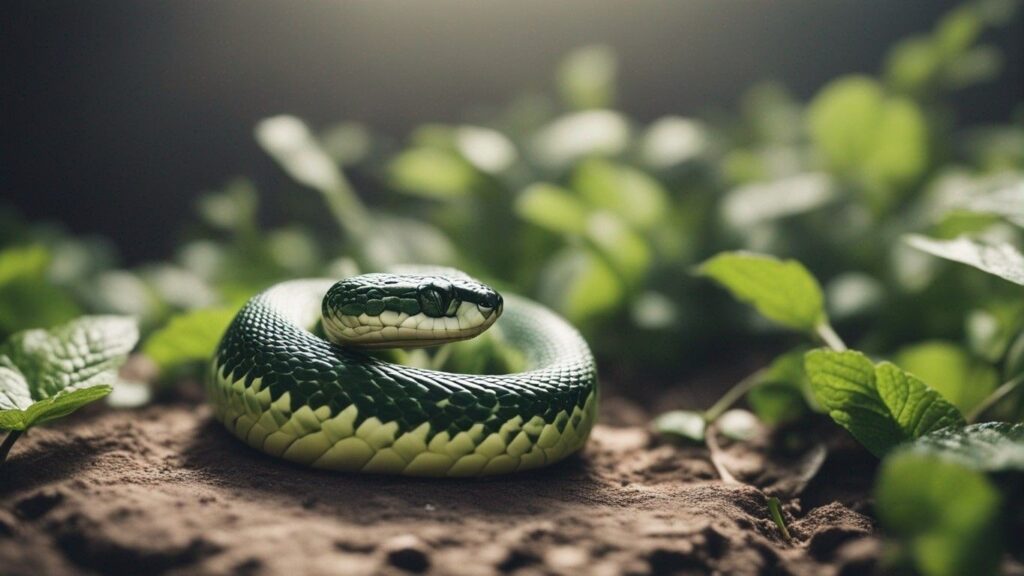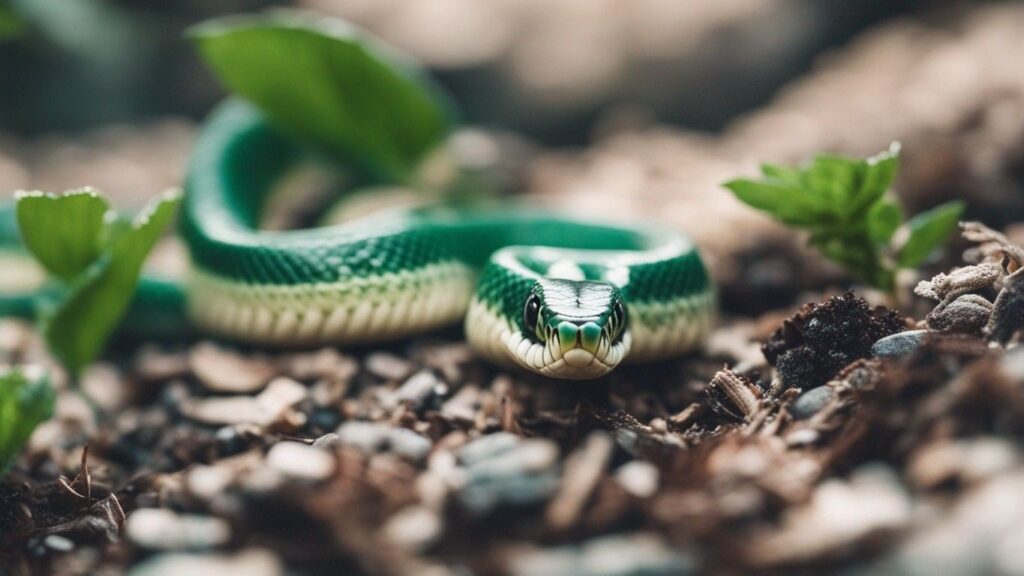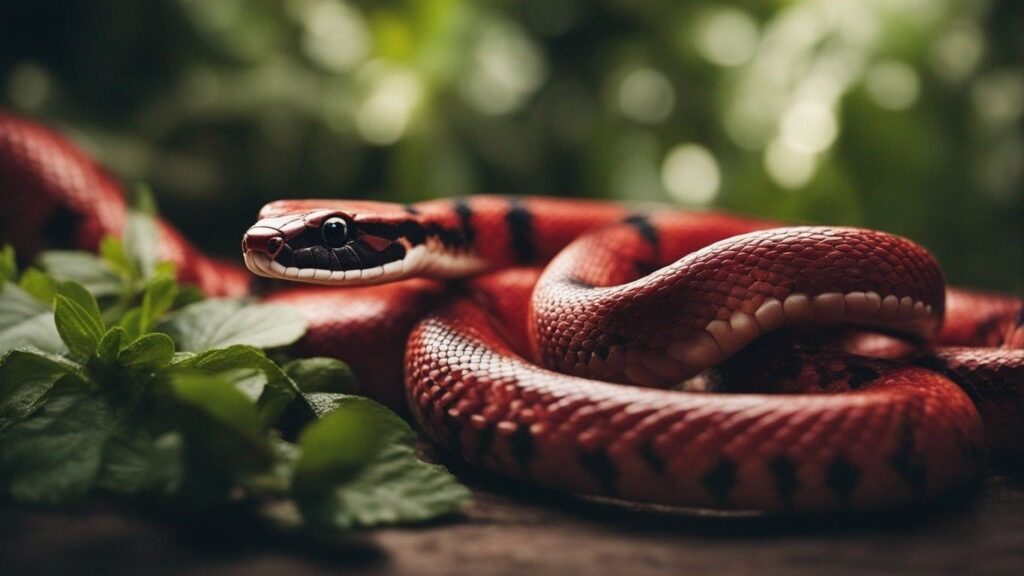Imagine a world where you can keep snakes at bay simply by using a common household ingredient: peppermint.
The intriguing question of whether peppermint repels snakes has puzzled homeowners and snake enthusiasts alike.
In this article, we will explore the truth behind this widely speculated theory, examining scientific research and anecdotal evidence to see if peppermint is indeed the secret weapon against our slithering reptilian neighbors.
Brace yourself to uncover the truth about whether peppermint has the power to repel snakes.
What is peppermint?
Peppermint, scientifically known as Mentha piperita, is a hybrid plant that is a cross between watermint and spearmint.
It is widely cultivated for its aromatic properties and has been used for centuries for various medicinal and culinary purposes.
This herbaceous perennial plant is known for its distinctive scent and refreshing flavor, making it a popular addition to teas, candles, and personal care products.
What is peppermint oil?
Peppermint oil is derived from the leaves of the peppermint plant through a process called steam distillation.
This essential oil contains numerous chemical compounds, including menthol, menthone, and limonene, which contribute to its characteristic aroma.
Peppermint oil is highly concentrated, and even a small amount can provide a strong and lasting scent.
What are the properties of peppermint oil?
Peppermint oil possesses several properties that make it a valued ingredient in various products.
It is known for its antimicrobial, antiviral, and antifungal properties, making it effective in treating minor skin infections and respiratory conditions.
Its analgesic and anti-inflammatory properties also make it useful for relieving headaches, muscle pain, and digestive discomfort.
Additionally, peppermint oil has a cooling effect on the skin, which can provide relief from itching and irritation.
How is peppermint oil used as a repellent?
Peppermint oil is reputed to have repellent properties, making it a popular choice for deterring insects and other pests.
Many people believe that snakes are also repelled by the scent of peppermint oil.
It has been suggested that applying peppermint oil or placing peppermint plants around certain areas can discourage snakes from entering or lingering in those spaces.
Snake repellents
Types of snake repellents
There are several types of snake repellents available on the market, ranging from chemical-based products to natural remedies.
Chemical-based snake repellents often contain ingredients such as sulfur, naphthalene, or ammonia, which are known to have repulsive effects on snakes.
Natural snake repellents, on the other hand, typically rely on strong odors or tastes that are unpleasant to snakes, causing them to avoid treated areas.
How do snake repellents work?
Snake repellents work by targeting the sensory abilities of snakes. Chemical repellents disrupt the snakes’ olfactory receptors, making it difficult for them to detect their surroundings and locate potential prey or shelter.
Natural repellents, including peppermint oil, produce odors that snakes find offensive and avoid as a result.
These repellents create an unfavorable environment for snakes, causing them to seek alternative locations away from treated areas.
Effectiveness of snake repellents
The effectiveness of snake repellents can vary depending on various factors, including the species of snake, environmental conditions, and application methods.
While some people report success in using snake repellents, it is important to note that no repellent is guaranteed to be 100% effective in deterring snakes.
Repellents should be used in conjunction with other preventive measures for optimal results.

Peppermint as a snake repellent
Claims about peppermint repelling snakes
Peppermint has gained popularity as a natural snake repellent due to claims that snakes are deterred by its strong scent.
Some individuals believe that the presence of peppermint oil or plants can keep snakes away from homes, gardens, or other areas where they are not welcomed.
Peppermint is said to disrupt a snake’s sensory perception and make the environment unsuitable for them.
Do snakes dislike the smell of peppermint?
While there is anecdotal evidence suggesting that snakes dislike the smell of peppermint, scientific research on this specific topic is limited.
It is important to approach these claims with caution and be skeptical until more conclusive evidence is available.
Snakes have complex sensory systems, and the effectiveness of peppermint as a repellent may vary among different species of snakes.
Do snakes avoid areas with peppermint plants?
Some homeowners and gardeners have found success in using peppermint plants to deter snakes.
The presence of peppermint plants may create a strong odor that snakes find unpleasant, causing them to avoid those areas.
However, it is essential to note that the effectiveness of this method can be influenced by various factors, including the species of snakes present and the concentration of peppermint plants.
Scientific research
Studies on the effect of peppermint oil on snakes
Despite the lack of extensive scientific research specifically focused on the repellent effects of peppermint oil on snakes, there have been some studies investigating the impact of various plant extracts and essential oils on snake behavior.
These studies offer valuable insights into the potential repellent properties of certain compounds.
Results of scientific experiments
In a study conducted by researchers at the University of Georgia, it was found that certain plant essential oils, including cinnamon, cedarwood, and clove oil, did exhibit repellent effects on some species of snakes.
However, the study did not specifically examine the effects of peppermint oil on snakes. While these results suggest that certain plant-based substances may deter snakes, further research is needed to ascertain the efficacy of peppermint oil as a snake repellent.
Are there any conflicting studies?
To date, there are no conflicting scientific studies specifically focused on the efficacy of peppermint oil as a snake repellent.
However, it is essential to acknowledge that the research in this area is limited. As with many natural remedies and repellents, the effectiveness of peppermint oil may vary depending on multiple factors, including the species of snakes and environmental conditions.
Natural snake deterrents
Other natural snake repellents
Peppermint is not the only natural substance believed to repel snakes. There are several other natural snake deterrents that people commonly use, such as cinnamon, sulfur, and vinegar.
These substances are known for their strong odors and may discourage snakes from entering treated areas.
Some individuals also report success with citrus peels, garlic, and certain essential oils like citronella or lemongrass.
Comparison of peppermint to other natural deterrents
When comparing peppermint to other natural snake deterrents, it is important to consider the effectiveness, availability, and personal preferences.
Each deterrent may have its specific attributes and limitations. Peppermint is generally considered safe for use around humans and pets and is readily available as an essential oil or plant.
However, comprehensive research comparing the effectiveness of different natural deterrents is currently lacking.
Pros and cons of using natural repellents
Using natural snake repellents like peppermint has both advantages and disadvantages.
One of the significant advantages is that natural repellents are generally considered safer for humans, pets, and the environment when compared to chemical alternatives.
Additionally, natural repellents offer a more sustainable and eco-friendly solution. However, their efficacy may be less consistent, and the strength of the repellent properties can vary among different substances and snake species.

Factors influencing efficacy
Species of snake
The efficacy of peppermint and other snake repellents can vary depending on the species of snakes present in an area.
Different snakes have distinct behaviors and preferences, so what may repel one species might not deter another.
Therefore, it is essential to consider the specific snake species when using repellents or implementing preventive measures.
Size and age of the snake
The size and age of a snake can also influence the effectiveness of snake repellents. Younger and smaller snakes may be more sensitive to certain scents and odors, making them more likely to be deterred by repellents.
On the other hand, larger and older snakes may be less affected by repellents and may require additional control methods.
Concentration and application method of peppermint oil
The concentration of peppermint oil and the manner in which it is applied can impact its effectiveness as a snake repellent.
Using a higher concentration of peppermint oil may produce a stronger scent that can potentially deter snakes better.
Additionally, evenly distributing the oil or planting peppermint strategically in areas of concern may enhance its repellent properties.
Presence of alternative food sources and shelter
The presence of alternative food sources and shelter can influence the efficacy of peppermint oil as a snake repellent.
If an area provides ample prey or suitable hiding spots, snakes may be less deterred by the scent of peppermint.
Therefore, it is crucial to address other attractants and make the environment less hospitable for snakes alongside using repellents.
Safety considerations
Is peppermint oil safe for humans?
Peppermint oil is generally considered safe for humans when used as directed. However, it is essential to exercise caution, particularly with concentrated essential oils.
Peppermint oil should not be ingested in large quantities, as it can cause digestive issues or allergic reactions in some individuals.
It is always advisable to perform a patch test before applying peppermint oil topically to ensure there are no adverse reactions.
Potential adverse effects of peppermint oil
While peppermint oil is generally safe, it can cause skin irritation or allergic reactions in some individuals.
It is important to dilute peppermint oil properly before applying it to the skin and discontinue use if any adverse reactions occur.
Ingesting excessive amounts of peppermint oil can also lead to adverse effects, such as nausea, vomiting, or respiratory issues.
Precautions when using peppermint oil around children and pets
Peppermint oil should be used with caution around children and pets. It is recommended to keep peppermint oil out of reach of young children, as ingestion of concentrated oil can be harmful.
Some animals may have sensitivities or allergies to essential oils, so it is best to consult with a veterinarian before using peppermint oil around pets or incorporating it into their environment.

Alternative snake control methods
Physical barriers
Installing physical barriers is an effective way to prevent snakes from entering certain areas.
This can include constructing snake-proof fences made of mesh or other materials, sealing gaps in buildings or foundations, and using door sweeps or weather stripping to prevent snake entry.
Physical barriers offer a more reliable method of snake control and complement the use of repellents.
Using trapping techniques
Trapping snakes can be an option for those who want to remove them from their property safely.
However, it is important to note that trapping and handling snakes should be performed by trained professionals to ensure the safety of both the person and the snake.
Trapping can be a temporary solution, as snakes may re-enter the area if the underlying attractants are not addressed.
Professional snake removal services
In cases where snakes pose a significant risk or if there is a recurring snake problem, it may be advisable to seek the assistance of professional snake removal services.
These professionals have the knowledge, experience, and tools necessary to safely and humanely remove snakes from the premises.
They can also provide advice on preventing future encounters with snakes.
Final Thoughts
In conclusion, peppermint has gained attention as a potential snake repellent due to its strong scent and the belief that snakes find it unpleasant.
While scientific research specifically focused on peppermint oil’s effectiveness as a snake repellent is limited, there have been studies demonstrating the repellent effects of certain plant extracts and oils on snakes.
However, it is crucial to approach claims about peppermint and other natural repellents with skepticism until further research is conducted.
When considering the use of peppermint as a snake repellent, it is important to understand that its efficacy can vary depending on factors such as the species of snake, environmental conditions, and application methods.
Additionally, it is essential to implement other preventive measures, address snake attractants, and consider the safety considerations associated with using peppermint oil.
While natural repellents like peppermint offer a safer and more environmentally friendly alternative to chemical options, they may not provide a foolproof solution.
It is recommended to combine the use of repellents with other methods such as physical barriers or professional assistance for optimal snake control.
Ultimately, it is crucial to prioritize safety and take a comprehensive approach when dealing with snakes and implementing repellent strategies.




